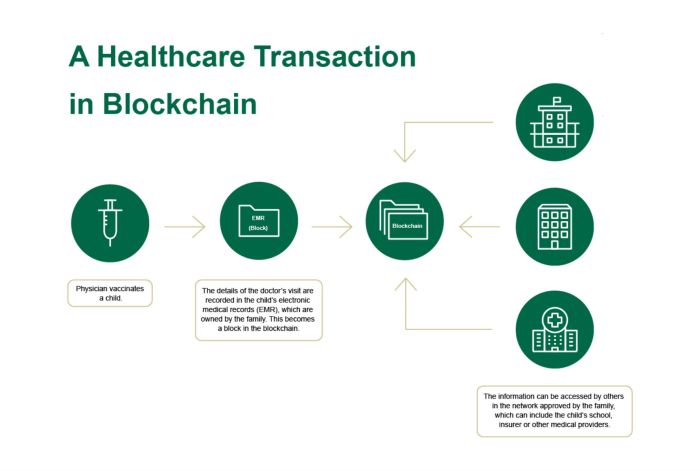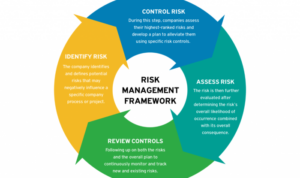Blockchain use in healthcare is changing the game, bringing innovation and security to the medical field. From data exchange to smart contracts, this technology is reshaping the way healthcare operates.
Overview of Blockchain in Healthcare

Blockchain technology is a decentralized and secure system that allows for the recording of transactions across a network of computers. In healthcare, this technology can be used to securely store and share patient data, ensuring privacy and integrity.
Current Uses of Blockchain in Healthcare
- Electronic Health Records (EHRs): Blockchain can be used to create a secure and tamper-proof system for storing and sharing patient medical records.
- Drug Traceability: Blockchain can track the supply chain of pharmaceuticals, ensuring authenticity and preventing counterfeit drugs from entering the market.
- Clinical Trials: Blockchain technology can improve transparency and data integrity in clinical trials, ensuring that results are accurate and trustworthy.
Benefits of Integrating Blockchain in Healthcare Systems
- Enhanced Security: Blockchain provides a secure and encrypted way to store sensitive patient data, reducing the risk of data breaches.
- Interoperability: Blockchain can facilitate the exchange of data between different healthcare providers, improving coordination of care and patient outcomes.
- Transparency: The decentralized nature of blockchain ensures that all transactions are recorded and transparent, reducing the risk of fraud and errors.
Security and Privacy in Healthcare Blockchain
Blockchain technology plays a crucial role in ensuring data security and privacy in healthcare. Unlike traditional healthcare databases, blockchain offers a decentralized and immutable ledger system that enhances security measures and prevents unauthorized access to sensitive patient information.
How Blockchain Ensures Data Security and Privacy
Blockchain utilizes cryptographic techniques to secure data transactions and maintain the integrity of the information stored within the network. Each block of data is encrypted and linked to the previous block, creating a chain that is virtually tamper-proof. This ensures that patient data remains secure and private, as only authorized individuals with the corresponding private keys can access the information.
Comparison with Traditional Healthcare Databases
Traditional healthcare databases are centralized and vulnerable to data breaches and cyber attacks. In contrast, blockchain’s decentralized nature eliminates the single point of failure, making it more secure against potential threats. Moreover, the immutability of blockchain technology ensures that once data is recorded, it cannot be altered or deleted without leaving a trace, providing an added layer of security.
Preventing Data Breaches and Unauthorized Access
Blockchain’s transparency and traceability features enable healthcare providers to track and verify access to patient data in real-time. Any unauthorized attempt to access or modify the data is immediately detected, reducing the risk of data breaches. Additionally, smart contracts can be implemented to enforce access control policies and automate the verification process, further enhancing data security and privacy in healthcare settings.
Interoperability and Data Exchange
Blockchain technology plays a crucial role in improving interoperability between different healthcare systems by providing a secure and decentralized platform for data exchange. This enhances communication and collaboration among healthcare providers, ensuring seamless sharing of patient information while maintaining data integrity and security.
Facilitating Secure Data Exchange
- Blockchain allows healthcare providers to securely exchange patient data in real-time, enabling timely decision-making and improving patient outcomes.
- Smart contracts embedded in blockchain technology ensure that data access and sharing are governed by predefined rules, enhancing data privacy and security.
- The use of cryptographic techniques in blockchain ensures that patient data remains tamper-proof and confidential, reducing the risk of data breaches and unauthorized access.
Challenges and Solutions
- Challenge: Integration with existing healthcare systems – Implementing blockchain technology may require significant changes to current systems and processes, posing interoperability challenges.
- Solution: Developing standardized protocols and interfaces to facilitate seamless integration of blockchain with existing healthcare systems, ensuring interoperability and data exchange.
- Challenge: Scalability – As the volume of healthcare data continues to grow, scalability issues may arise in blockchain networks, affecting data exchange efficiency.
- Solution: Implementing off-chain solutions and optimizing blockchain protocols to enhance scalability and accommodate the increasing data volume, ensuring smooth data exchange processes.
Smart Contracts and Automation: Blockchain Use In Healthcare
Smart contracts play a crucial role in automating processes within the healthcare industry, revolutionizing the way tasks are executed and managed. By leveraging blockchain technology, smart contracts can streamline various operations, leading to increased efficiency and reduced costs.
Streamlining Insurance Claims Processing
Smart contracts can automate the verification and processing of insurance claims, eliminating the need for manual intervention and speeding up the reimbursement process. Through predefined conditions and protocols, smart contracts ensure that claims are settled accurately and transparently, reducing errors and fraud.
Enhancing Patient Consent Management, Blockchain use in healthcare
In healthcare, obtaining and managing patient consent is essential for delivering quality care while ensuring data privacy. Smart contracts can automate the consent process, securely recording patients’ permissions on the blockchain. This not only simplifies consent management but also enhances data security and compliance with regulations such as GDPR.
Reducing Administrative Overhead
The implementation of smart contracts in healthcare can significantly reduce administrative overhead by automating routine tasks like appointment scheduling, billing, and inventory management. This automation leads to cost savings, improved accuracy, and more time for healthcare professionals to focus on patient care rather than paperwork.






